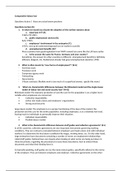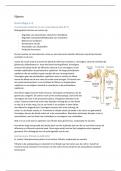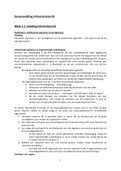Comparative labour law
Questions lecture 1 🡪 these are actual exam questions
Questions Lecture EU
1. In what era would you situate the adoption of the earliest statutes about
a. equal pay m/f (A),
1960’s/70’s/80’s
b. public employment services (B),
Early 1900’s
c. employees’ involvement in the enterprise (C),
1950’s, wet op de onderneemingsraad (act on workers councils)
d. unemployment benefits (D)?
Most countries have good legislation from WWII onward but some like the UK have earlier
e. Is the answer the same for France, Germany and your country?
Sometimes, the answer for other countries is different. Unemployment benefits is definitely
different; Belgium, UK, Netherlands already had good unemployment benefits (1948)
2. What is often meant by “new forms of employment”? (R-U)
- Part-time work
- Freelance work
- Temporary agency work
- Teleworking
- Gig economy
- 0 hours contracts (flexible work is too much of a superficial answer, specify this more)
3. What are characteristic differences between the Rhineland model and the Anglo-Saxon
model of labour law and social security law? (M-Q)
Rhineland model: The statutory protection of and the care for the population is on a higher level,
notable when employees are concerned.
• Collective responsibility
• Active role trade unions and employers’ organizations
• Strong social security
Ango-Saxon model: The emphasis is on a proper functioning of the laws of the market; the
protection and the care for the entire population, including employees, is at a relatively low level,
leaving much to individuals to personally improve their situation.
• Individual responsibility
• Flexible labour market
4. What is the characteristic difference between staff guides and collective agreements? (K-L)
In all EU countries, collective agreements are very important instruments governing working
conditions. They are contracts concluded between employers and trade unions (not with individual
workers!) to determine the key labour conditions like wages, working times, etc. On the other hand,
large enterprises have documents containing a number of norms on employment relationships
called staff guides. National laws vary largely when looking at what norms are being put down in
these documents, regarding the procedures to issue these documents, how to amend these
documents and what their binding force is.
So basically speaking, staff guides are (as the name states) guides, specifically tailored to the norms
of the employer. They are between employee and employer. Collective agreements on the other
,hand are legislative agreements, contracts, between employers and trade unions. Within collective
agreements, these two parties agreed on basic key aspects of the job such as minimum wage etc.
5. Several European countries recognise staff guides, company rules, règlements intérieurs,
etc. as a source of labour law. Question: what is usually the rank of such sources in the
hierarchy of sources of labour law? Why such a high/low position? (See also par. 4.2.b of
the syllabus L&LiE) (H-J)
Vergelijkbaar met vraag 4
6. Give an example of the clauses dérogatoires/Dispositives Recht/driekwartdwingend recht/
waiver clauses in the labour law of your country (E-G)
Finland: a waiver of rights is possible only in exit or settlement agreements and only ot a certain
extent. According to the employment contracts act, an employee cannot waive mandatory minimum
rights provided by the act.
Germany: referring the dismissal notice period. According to this its allowed to deviate from the
dismissal notice period in a collective agreement even if its unfavorable
7. Can you imagine an example of a clash between fundamental rights in the field of Labour
law or social security law? (V-Z)
Social security: point of the control on social security; if people are getting unemployment benefits,
the state wants to know that they really deserve that benefit. E.g. an unemployment benefit 🡪 state
wants to have a certain level of control that someone is really unemployed. 🡪 people can say this
control and checking is an infringement of privacy; unemployment benefits are a fundamental right
but privacy too; however this conflicts with one another 🡪 having a policeman visiting someone who is
unemployed every day to check if they are still unemployed would be a big infringement on the
privacy; however a certain measure of control and thus also infringement of privacy is allowed to
keep the state benefits in a sustainable system. Will see more examples in the next lectures
Dismissal notice period: the employer has to take into account the moment between saying he is
firing the employee till the moment this employee will actually have to leave the job
Questions Lecture USA
1. Could you find examples of changes, made in American Labour Law by the actual Trump
Administration (A-K)?
He changed of who may be considered a ‘joint employer’ 🡪 this concept refers to the situation in
which more than one employee has impact on terms and conditions of employment of single
workforce
Department of Labour (DOL) has resumed the use of opinion letters that describe how the agency
would enforce federal wage and hour laws in specific circumstances presented by an employer,
worker or other party who requests the opinion. The depart stopped issuing these letters in 2010
and replaced them with more general guidance
Trump didn’t specifically change a complete law; he has been working slowly to change certain
details however.
Quickly after Trump coming to power, his daughter has mentioned being in favour of introducing
multiple forms of paid leave regulations (such as maternity leave) 🡪 she has lobbied for it and her dad
(Trump) accepted it. In one certain field there’s now a certain form of paid maternity leave 🡪 thus only
a few employees have a form of paid leave.
, 2. Would the balance of power in the USA Court of Justice change if next month Judge
Ginsburg would retire / pass away(L-Z)?
Yes, because then Trump would be able to give someone else this position for life, which would
mean that another liberal judge is replaced with a conservative (republican)
Questions for students L2
1. What action has a trade union in Norway when the Norwegian legislation has not
(correctly) implemented Art. 7 of the European Social Charter? (I J)
● Under the European social charter, trade unions indeed have the possibility to send
in complaints. After they have lodged a complaint to the committee, the European
committee of social rights will inquire the problem and give a judgement. The
judgement is not binding however, so Norway can decide to ignore this judgement.
2. What action has a trade union in France when the French legislation has not (correctly)
implemented Art. 10 of the European Convention on Human Rights? (K L)
● France has ratified this in 1973, this means they have to follow it
● The European social charter makes it possible for trade unions to level a complaint.
The European convention of human rights however does not have such a special
provision
● What trade unions can do is send one of the members inside to take all of the action
by going through the French court and then ultimately to European court in
Strasburg.
3. What action has a trade union in Turkey when the Turkish legislation has not (correctly)
implemented Art. 8 of the UN Int. Covenant on Economic, Social and Cultural Rights? (M
N)
● They can file a complaint which may lead to ‘opinions’ or even ‘decisions’ of
supervising bodies about alleged violations of Art. 8 of the UN int. covenant on
economic, social and cultural rights.
● There is no court on international level that can force turkey to implement the art. 8
of the UN int. covenant on economic, social and cultural rights
● UN conventions produce indirect and voluntary rules
4. What action has a trade union in The Netherlands l when the Dutch legislation has not
(correctly) implemented Art. 7 of the ILO Convention on Holidays with pay? (O P)
● The conventions of the ILO are often not signed by the member states
● With ILO conventions you must be very careful and first research whether a country
has ratified a convention of the ILO which you would like to invoke in court
● The convention of holidays with pay has not been ratified by the Netherlands, so the
trade union can do nothing about this.
5. What action has a citizen in Britain when the British legislation has not (correctly)
implemented Art. 4 of the European Social Charter? (A B)
● Citizens can only invoke these rights in court if they have been transposed into laws
by legislators. This is because Britain has a dualist system.
● They can still decide to stick to the national legislation; all you can really do is write a
polite letter to the supervising instrument of the European social charter (European
committee of social rights) and perhaps they will pay attention to this problem and
send a letter to the British government to change things; however, there will not be
a possibility for direct legal action.
6. What action has a citizen in Russia when the Russian legislation has not (correctly)
implemented Art. 10 of the European Convention on Human Rights? (C D)
Questions lecture 1 🡪 these are actual exam questions
Questions Lecture EU
1. In what era would you situate the adoption of the earliest statutes about
a. equal pay m/f (A),
1960’s/70’s/80’s
b. public employment services (B),
Early 1900’s
c. employees’ involvement in the enterprise (C),
1950’s, wet op de onderneemingsraad (act on workers councils)
d. unemployment benefits (D)?
Most countries have good legislation from WWII onward but some like the UK have earlier
e. Is the answer the same for France, Germany and your country?
Sometimes, the answer for other countries is different. Unemployment benefits is definitely
different; Belgium, UK, Netherlands already had good unemployment benefits (1948)
2. What is often meant by “new forms of employment”? (R-U)
- Part-time work
- Freelance work
- Temporary agency work
- Teleworking
- Gig economy
- 0 hours contracts (flexible work is too much of a superficial answer, specify this more)
3. What are characteristic differences between the Rhineland model and the Anglo-Saxon
model of labour law and social security law? (M-Q)
Rhineland model: The statutory protection of and the care for the population is on a higher level,
notable when employees are concerned.
• Collective responsibility
• Active role trade unions and employers’ organizations
• Strong social security
Ango-Saxon model: The emphasis is on a proper functioning of the laws of the market; the
protection and the care for the entire population, including employees, is at a relatively low level,
leaving much to individuals to personally improve their situation.
• Individual responsibility
• Flexible labour market
4. What is the characteristic difference between staff guides and collective agreements? (K-L)
In all EU countries, collective agreements are very important instruments governing working
conditions. They are contracts concluded between employers and trade unions (not with individual
workers!) to determine the key labour conditions like wages, working times, etc. On the other hand,
large enterprises have documents containing a number of norms on employment relationships
called staff guides. National laws vary largely when looking at what norms are being put down in
these documents, regarding the procedures to issue these documents, how to amend these
documents and what their binding force is.
So basically speaking, staff guides are (as the name states) guides, specifically tailored to the norms
of the employer. They are between employee and employer. Collective agreements on the other
,hand are legislative agreements, contracts, between employers and trade unions. Within collective
agreements, these two parties agreed on basic key aspects of the job such as minimum wage etc.
5. Several European countries recognise staff guides, company rules, règlements intérieurs,
etc. as a source of labour law. Question: what is usually the rank of such sources in the
hierarchy of sources of labour law? Why such a high/low position? (See also par. 4.2.b of
the syllabus L&LiE) (H-J)
Vergelijkbaar met vraag 4
6. Give an example of the clauses dérogatoires/Dispositives Recht/driekwartdwingend recht/
waiver clauses in the labour law of your country (E-G)
Finland: a waiver of rights is possible only in exit or settlement agreements and only ot a certain
extent. According to the employment contracts act, an employee cannot waive mandatory minimum
rights provided by the act.
Germany: referring the dismissal notice period. According to this its allowed to deviate from the
dismissal notice period in a collective agreement even if its unfavorable
7. Can you imagine an example of a clash between fundamental rights in the field of Labour
law or social security law? (V-Z)
Social security: point of the control on social security; if people are getting unemployment benefits,
the state wants to know that they really deserve that benefit. E.g. an unemployment benefit 🡪 state
wants to have a certain level of control that someone is really unemployed. 🡪 people can say this
control and checking is an infringement of privacy; unemployment benefits are a fundamental right
but privacy too; however this conflicts with one another 🡪 having a policeman visiting someone who is
unemployed every day to check if they are still unemployed would be a big infringement on the
privacy; however a certain measure of control and thus also infringement of privacy is allowed to
keep the state benefits in a sustainable system. Will see more examples in the next lectures
Dismissal notice period: the employer has to take into account the moment between saying he is
firing the employee till the moment this employee will actually have to leave the job
Questions Lecture USA
1. Could you find examples of changes, made in American Labour Law by the actual Trump
Administration (A-K)?
He changed of who may be considered a ‘joint employer’ 🡪 this concept refers to the situation in
which more than one employee has impact on terms and conditions of employment of single
workforce
Department of Labour (DOL) has resumed the use of opinion letters that describe how the agency
would enforce federal wage and hour laws in specific circumstances presented by an employer,
worker or other party who requests the opinion. The depart stopped issuing these letters in 2010
and replaced them with more general guidance
Trump didn’t specifically change a complete law; he has been working slowly to change certain
details however.
Quickly after Trump coming to power, his daughter has mentioned being in favour of introducing
multiple forms of paid leave regulations (such as maternity leave) 🡪 she has lobbied for it and her dad
(Trump) accepted it. In one certain field there’s now a certain form of paid maternity leave 🡪 thus only
a few employees have a form of paid leave.
, 2. Would the balance of power in the USA Court of Justice change if next month Judge
Ginsburg would retire / pass away(L-Z)?
Yes, because then Trump would be able to give someone else this position for life, which would
mean that another liberal judge is replaced with a conservative (republican)
Questions for students L2
1. What action has a trade union in Norway when the Norwegian legislation has not
(correctly) implemented Art. 7 of the European Social Charter? (I J)
● Under the European social charter, trade unions indeed have the possibility to send
in complaints. After they have lodged a complaint to the committee, the European
committee of social rights will inquire the problem and give a judgement. The
judgement is not binding however, so Norway can decide to ignore this judgement.
2. What action has a trade union in France when the French legislation has not (correctly)
implemented Art. 10 of the European Convention on Human Rights? (K L)
● France has ratified this in 1973, this means they have to follow it
● The European social charter makes it possible for trade unions to level a complaint.
The European convention of human rights however does not have such a special
provision
● What trade unions can do is send one of the members inside to take all of the action
by going through the French court and then ultimately to European court in
Strasburg.
3. What action has a trade union in Turkey when the Turkish legislation has not (correctly)
implemented Art. 8 of the UN Int. Covenant on Economic, Social and Cultural Rights? (M
N)
● They can file a complaint which may lead to ‘opinions’ or even ‘decisions’ of
supervising bodies about alleged violations of Art. 8 of the UN int. covenant on
economic, social and cultural rights.
● There is no court on international level that can force turkey to implement the art. 8
of the UN int. covenant on economic, social and cultural rights
● UN conventions produce indirect and voluntary rules
4. What action has a trade union in The Netherlands l when the Dutch legislation has not
(correctly) implemented Art. 7 of the ILO Convention on Holidays with pay? (O P)
● The conventions of the ILO are often not signed by the member states
● With ILO conventions you must be very careful and first research whether a country
has ratified a convention of the ILO which you would like to invoke in court
● The convention of holidays with pay has not been ratified by the Netherlands, so the
trade union can do nothing about this.
5. What action has a citizen in Britain when the British legislation has not (correctly)
implemented Art. 4 of the European Social Charter? (A B)
● Citizens can only invoke these rights in court if they have been transposed into laws
by legislators. This is because Britain has a dualist system.
● They can still decide to stick to the national legislation; all you can really do is write a
polite letter to the supervising instrument of the European social charter (European
committee of social rights) and perhaps they will pay attention to this problem and
send a letter to the British government to change things; however, there will not be
a possibility for direct legal action.
6. What action has a citizen in Russia when the Russian legislation has not (correctly)
implemented Art. 10 of the European Convention on Human Rights? (C D)












